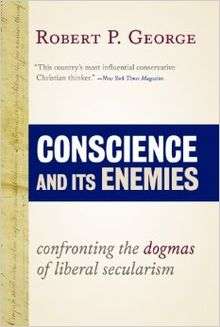Conscience and Its Enemies
 Cover of the first edition | |
| Authors | Robert P. George |
|---|---|
| Country | United States |
| Language | English |
| Subject | Ethics |
| Publisher | ISI Books |
Publication date | 2013 |
| Pages | 384 |
| ISBN | 978-1610170703 |
Conscience and Its Enemies: Confronting the Dogmas of Liberal Secularism is a 2013 book by Robert P. George, the McCormick professor of Jurisprudence at Princeton University in Princeton, New Jersey. The book was widely reviewed, and received both positive and negative reviews.
Content
The book is a collection of twenty-eight essays.[1] The main topics are abortion and same-sex marriage.[1] Another topic is immigration.[2] George approaches these topics via natural law.[1]
Critical reception
The book was praised by Anthony Esolen in Crisis Magazine.[3] Similarly, Ed Gantt, a Visiting Fellow at the Wheatley Institution at Brigham Young University, suggested "the essays in this volume [were] concise, clearly argued, and enlightening."[4] He concluded that it was "a truly wonderful book, a must-read for anyone serious interested in developing a deeper and more sophisticated understanding of the important social and moral issues of our day."[4] Writing for The Washington Times, William Murchison praised the book, suggesting, "There’s not a boring or humdrum essay in the lot."[5]
Writing for The New York Times, Kay S. Hymowitz, a Fellow at the conservative think tank Manhattan Institute, called it, "a plea for liberty of conscience, or more specifically, for religious liberty."[6] She rejected the notion that George's ideas were homophobic, arguing that his "philosophical ideas [...] predate the modern concept of sexual identity."[6] She added that he was "exceptionally nimble when he spars with conventional contemporary political and social thought."[6] She concluded that he spoke "for a sizable number of conscientious objectors to America’s ruling liberal secularism."[6]
In America, Kevin M. Doyle criticized the book, arguing that it was "noncommital, sending signals in different directions."[1] George published a dissenting response in Public Discourse, the journal of the Witherspoon Institute with which he is affiliated.[7] Writing for Commentary, Pascal-Emmanuel Gobry suggested George's use of natural law was reductive.[8] He added that George fails to address the fact that opposition to abortion rights was historically misogynistic.[8] Moreover, he argued that George failed to explain "how the constitutional system would work without judicial review," adding that his faith in an "informed citizenry" was naive.[8] He concluded that the book would fail to influence George's liberal critics.[8]
References
- 1 2 3 4 Kevin M. Doyle, Lamb, Fox, Lion, America, November 18, 2013
- ↑ What 'Conscience' Really Means: Towards a Reintroduction, The National Review, July 12, 2013
- ↑ Anthony Esolen, Why We Should Respect Someone Else's Conscience, Crisis Magazine, September 6, 2013
- 1 2 Wheatley Institution: Review of Conscience and Its Enemies
- ↑ William Murchison, Book Review: 'Conscience and Its Enemies', The Washington Times, June 18, 2013
- 1 2 3 4 Kay S. Hymowitz, Natural Lawyer, The New York Times, June 21, 2013
- ↑ Robert P. George, Conscience and Its Reviewers: A Response to Kevin Doyle, Public Discourse, November 20, 2013
- 1 2 3 4 Pascal-Emmanuel Gobry, A Moral Authority, Commentary, July 01, 2013